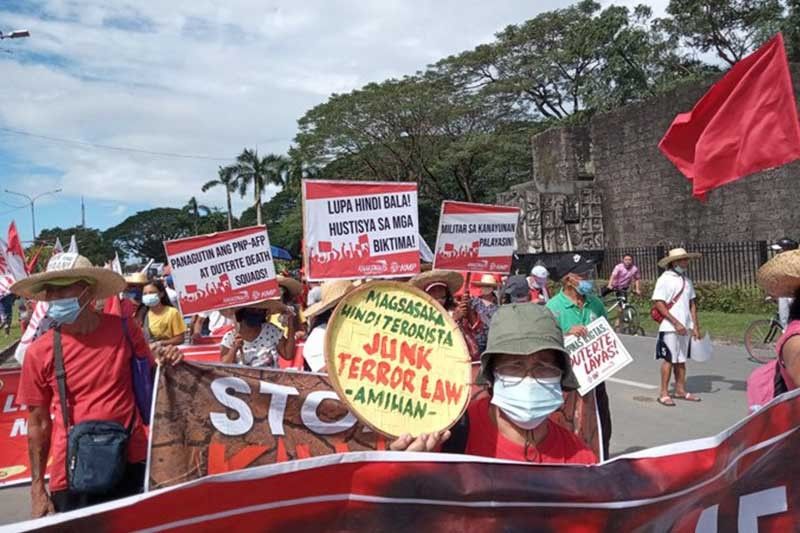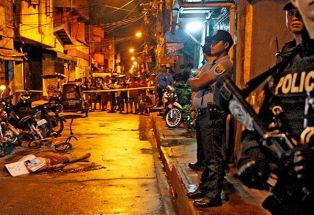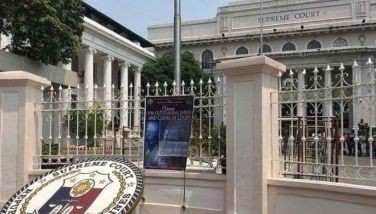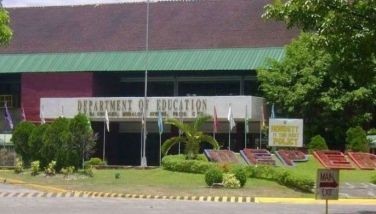Anti-Terrorism Council irons out delisting process as state allegations vs activists pile up

MANILA, Philippines — As debate at the Senate on red-tagging heats up and President Rodrigo Duterte revives claims of a communist conspiracy to oust him, the Anti-Terrorism Council has been working on its internal rules for the delisting of designated terrorists and terrorist organizations.
DOJ Undersecretary Adrian Sugay, spokesperson of the ATC, said the council is currently crafting its internal rules for delisting — or how one can dispute state allegations of being a terrorist or of being part of a terrorist group.
"We hope to submit the rules for the ATC’s consideration within the month," Sugay told Philstar.com.
Under the Implementing Rules and Regulations of the Anti-Terrorism Act of 2020, the government may publish its list of suspected terrorists online and in national dailies — a provision branded by Bayan Muna, a party-list long accused of being a front for communist rebels, as "the mother of all red-tagging."
READ: 'Mother of red-tagging': No process yet to remove names from terror list
Those designated as suspected terrorists may file a verified request for delisting with the ATC within 15 days of publication of the lists. The appeal may be filed more than once, but if denied, the next request can only be done six months later.
More than a month has passed since the IRR was released and the ATC has yet to come up with its internal rules for the delisting process. Sugay added that the ATC is set to meet next week. “We will try to finish the rules before then,” he added.
Sugay explained that the ATC regularly meets once a month, and after next week’s meeting, the ATC’s next schedule is in January.
The ATC is headed by the executive secretary with the national security adviser as the vice chairperson. Other members of the council are secretaries of foreign affairs, national defense, interior and local government, finance, justice, information and communications technology, and the executive director of the Anti-Money Laundering Council secretariat.
The DOJ worked on and issued the IRR of the law in October. The department is also in charge of two other high-profile tasks: Conducting a corruption probe into the "entire government" and leading the review panel looking into "drug war" operations that led to deaths.
Criminal prosecution under ATA and intensified red-tagging
Two Aetas are currently detained for their supposed violation of the anti-terrorism law, a charge that their lawyers said are trumped up.
Jasper Gurung and Junior Ramos, who are believed to be the first charged under the new law, have been accused of “conspiring, confederating and cooperating with each other” and of engaging in acts “intended to cause death or serious bodily injury to any person or endangers a [person’s] life, by firing and shooting at members of the Armed Forces of the Philippines.”
The Anti-Terrorism Act of 2020 is facing 37 legal challenges at the SC, but oral arguments on the petitions are scheduled on January 19. Among the issues to be debated on the oral arguments is the issuance of a temporary restraining order or status quo ante order.
At least 23 of these 37 petitioners, in a show of unity, filed a joint motion last week and urged the SC to issue a TRO or SQAO to restrain the government from implementing the law.
RELATED: With SC debate on anti-terror law set for January, 2 Aetas may spend holidays in detention
While petitioners are pressing the SC for relief, red-tagging and terrorist-tagging continue, with President Rodrigo Duterte himself throwing the latest accusation against lawmakers of the House’s Makabayan bloc.
In a public address aired Monday night, Duterte said he is “identifying” Makabayan, Bayan and Gabriela as legal fronts of the Communist Party of the Philippines-New People's Army-National Democratic Front — an accusation long denied by the progressive groups.
Bayan Muna and Gabriela are party-lists with elected representatives at the House of Representatives.
The Commission on Human Rights has time and again reminded the government that red-tagging is dangerous and puts lives of those named at risk. The government has countered that what it is doing is "truth tagging".
The Senate on Tuesday resumed its legislative inquiry into red-tagging of personalities and celebrities.
RELATED: Ramped-up red-tagging a prelude to crackdown under anti-terror law, Casiño warns
- Latest
- Trending
































